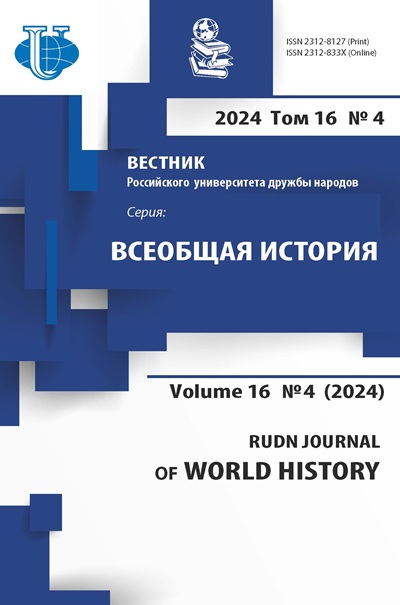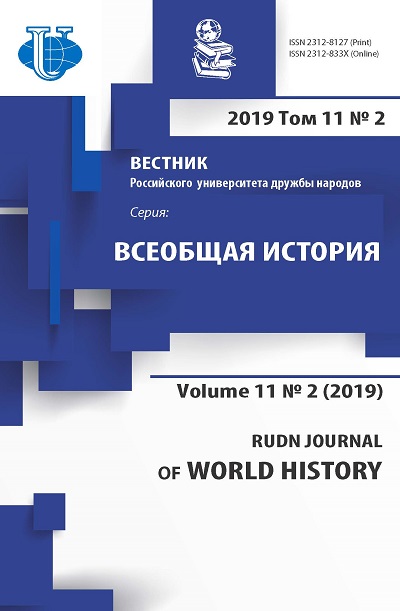Vol 11, No 2 (2019)
- Year: 2019
- Articles: 5
- URL: https://journals.rudn.ru/world-history/issue/view/1267
- DOI: https://doi.org/10.22363/2312-8127-2019-11-2
Full Issue
Ideas and politics in history
Antidote to Civil War? European ‘small states’ and political legitimacy during World War II
Abstract
The experience of European small states involved in World War II varied widely. Not all of them entered the war as victims of aggression, and even those that did so did not necessarily share the same dire consequences of warfare and/or foreign occupation; they also exited the war in, sometimes dramatically different ways: a number of small states entered the post-war period relatively peacefully, other were plunged into civil war, while a third category experienced a measure of unrest short of civil strife. It is argued in this paper that, among the factors influencing the outcome of a European small state’s involvement in World War II, the political legitimacy of its government should not be underestimated. The impact of this factor was particularly felt during the sensitive transition period from war and/or occupation into peacetime. Reinterpreting existing material, it is further argued that, during the war, democratic legitimacy increasingly appeared to guarantee a safer ground for both withstanding wartime travails and achieving a relatively smooth restoration of free national institutions, without the risk of civil war.
 117-135
117-135


Emigration of Jews from the Soviet Union in the 1960-1970s through the eyes of the American press
Abstract
The article analyzes the features of Soviet emigration and repatriation in the second half of the 1960s through the early 1970s, when for the first time after a long period of time, and as a result of political agreements between the USSR and the USA, hundreds of thousands of Soviet Jews were able to leave the Soviet Union for good and settle in the United States and Israel. Our attention is focused not only on the history of this issue and the overall political situation of that time, but mainly on the peculiarities of this issue coverage by the leading American printed media. The reference to the media as the main empirical source of this study allows not only perceiving the topic of emigration and repatriation in more detail, but also seeing the regularities of the political ‘face’ of the American press of that time. This study enables us to expand the usual framework of knowledge of emigration against the background of its historical and cultural development in the 20th century.
 136-160
136-160


Clan hierarchy as the basis of the “tulip revolution” in Kyrgyzstan
Abstract
In 2005, the so-called Tulip Revolution took place in Kyrgyzstan. In terms of form and content, the events that took place in Kyrgyzstan fully fit into the concept of protest movements (velvet, melon, jasmine and other revolutions) that unfolded at the end of the 20th and beginning of the 21st centuries. The start to such “revolutions” aimed at changing the regime was given in 1953, when the Prime Minister of Iran Mossadyk was removed from power during the coup d’etat, which was supervised by the CIA. An analysis of the events in Kyrgyzstan showed that behind the coup that led to the overthrow of President Askar Akayev, there were external forces coordinating their efforts in accordance with the methodological recommendations of the American technologist of political coups Gene Sharpe. However, external actions, for all their significance, did not become the main cause of the Tulip Revolution, but acted only as a catalyst. Over the centuries, in Kyrgyzstan there has been a complex of internal contradictions between various political groups, which became the detonator of a political cataclysm in 2005. One of the most significant internal causes of the political crisis of 2005 was the clan rivalry of the North and South in the struggle for power. The clan hierarchy has been the foundation of the political systems of Central Asia for centuries; Kyrgyzstan was no exception. The article is devoted to the consideration of the mechanism of the clan hierarchy, the analysis of political competition between the North and the South, the role and importance of clans during the 2005 coup.
 161-171
161-171


Theory and methodolology in history
Principle of trans-subjectivity in Luhmann’s historical methodology
Abstract
This article examines the problem of trans-subjectivity in Niklas Luhmann’s historical methodology. Trans-subjectivity, like inter-subjectivity, is understood in the humanities in different ways (N. Lossky, A. Bergson, I. Prigogine and others). Luhmann’s exploration of time leads him to devide it into “eternity” ( aeternitas ) and “system time” ( tempus ). Each manifestation of the latter is imbued with a special meaning that distinguishes one system time from another. History is reconstructed within the framework of the time dimension of meaning. These temporally measured meanings are the framework for reconstructing. This means that in historical methodology Luhmann essentially defended the principle of trans-subjectivism, although he denied the ontological positions of subject and object. In the framework of a forming system-communication approach significantly based on Luhmann’s historical methodology, trans-subjectivity becomes a new, more substantive and maximally realistic (and therefore more objective) understanding of the principle of historicism, when the past is viewed through the prism of the perception of a particular person, regarded as both the subject and the object of history. If in digital history such an ontological superposition is especially applicable thanks to the new conditions of an informal environment that allows for an almost total self-description of society (according to Luhmann), and records the digital footprints of social actions of the Ego , in non-digital traditional historical science it can also be used as a fertile conceptual scheme, and explanatory model.
 172-178
172-178


History of historical science
G.N. Roerich and his analysis of the history of Indology in Russia
Abstract
The scientific heritage of Russian orientalist G.N. Roerich (1902-1960) is still not studied sufficiently. The goal of this article is to examine G.N. Roerich’s work “Indology in Russia”, which was published in English in an Indian journal (Journal of the Greater India Society) in 1945. In this article G.N. Roerich presented his vision of what is indological research meant to be. Besides G.N. Roerich’s work the article considers the works of modern indologists S.D. Serebryaniy and Ya.V. Vasil’kov, who gave their valuation of G.N. Roerich’s article. The author estimates G.N. Roerich’s contribution to the history of the oriental studies as important, and considers S.D. Serebryaniy’s work as the continuation of G.N. Roerich’s research, which covers the span till 1945.
 179-188
179-188
















